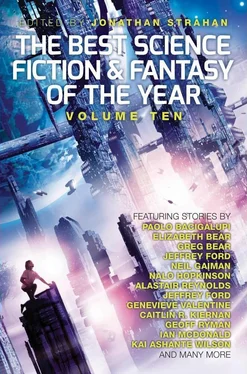“You know how he gets when you’re away,” his mother had said, on the phone, the night before, preparing me. “He’s a teenager now. Hating your parents is a normal part of it.”
I hadn’t listened, then. My hands and thighs still ached from months of straddling an ice saw; my hearing was worse with every trip; a slip had cost me five days work and five days pay and five days’ worth of infirmary bills; I had returned to a sweat-smelling bunk in an illegal room I shared with seven other iceboat workers – and none of it mattered because in the morning I would see my son.
“Hey,” he murmured emotionlessly. “Dad.”
I stepped back, turned away until the red ebbed out of my face. Spring had come and the city had lowered its photoshade. It felt good, even in the cold wind.
“You guys have fun,” Lajla said, pressing money discretely into my palm. I watched her go with a rising sense of panic. Bring back my son , I wanted to shout, the one who loves me. Where is he. What have you done with him. Who is this surly creature . Below us, through the ubiquitous steel grid that held up Qaanaaq’s two million lives, black Greenland water sloshed against the locks of our floating city.
Breathe, Dom , I told myself, and eventually I could. You knew this was coming. You knew one day he would cease to be a kid.
“How’s school?” I asked.
Thede shrugged. “Fine.”
“Math still your favorite subject?”
“Math was never my favorite subject.”
I was pretty sure that it had been, but I didn’t want to argue.
“What’s your favorite subject?”
Another shrug. We had met at the sea lion rookery, but I could see at once that Thede no longer cared about sea lions. He stalked through the crowd with me, his face a frozen mask of anger.
I couldn’t blame him for how easy he had it. So what if he didn’t live in the Brooklyn foster-care barracks, or work all day at the solar-cell plant school? He still had to live in a city that hated him for his dark skin and ice-grunt father.
“Your mom says you got into the Institute,” I said, unsure even of what that was. A management school, I imagined. A big deal for Thede. But he only nodded.
At the fry stand, Thede grimaced at my clunky Swedish. The counter girl shifted to a flawless English, but I would not be cheated of the little bit of the language that I knew. “French fries and coffee for me and my son,” I said, or thought I did, because she looked confused and then Thede muttered something and she nodded and went away.
And then I knew why it hurt so much, the look on his face. It wasn’t that he wasn’t a kid anymore. I could handle him growing up. What hurt was how he looked at me: like the rest of them look at me, these Swedes and grid city natives for whom I would forever be a stupid New York refugee, even if I did get out five years before the Fall.
Gulls fought over food thrown to the lions. “How’s your mom?”
“She’s good. Full manager now. We’re moving to Arm Three, next year.”
His mother and I hadn’t been meant to be. She was born here, her parents Black Canadians employed by one of the big Swedish construction firms that built Qaanaaq back when the Greenland Melt began to open up the interior for resource extraction and grid cities starting sprouting all along the coast. They’d kept her in public school, saying it would be good for a future manager to be able to relate to the immigrants and workers she’d one day command, and they were right. She even fell for one of them, a fresh-off-the-boat North American taking tech classes, but wised up pretty soon after she saw how hard it was to raise a kid on an ice worker’s pay. I had never been mad at her. Lajla was right to leave me, right to focus on her job. Right to build the life for Thede I couldn’t.
“Why don’t you learn Swedish?” he asked a French fry, unable to look at me.
“I’m trying,” I said. “I need to take a class. But they cost money, and anyway I don’t have –”
“Don’t have time. I know. Han’s father says people make time for the things that are important for them.” Here his eyes did meet mine, and held, sparkling with anger and abandonment.
“Han one of your friends?”
Thede nodded, eyes escaping.
Han’s father would be Chinese, and not one of the laborers who helped build this city – all of them went home to hardship-job rewards. He’d be an engineer or manager for one of the extraction firms. He would live in a nice house and work in an office. He would be able to make choices about how he spent his time.
“I have something for you,” I said, in desperation.
I hadn’t brought it for him. I carried it around with me, always. Because it was comforting to have it with me, and because I couldn’t trust that the men I bunked with wouldn’t steal it.
Heart slipping, I handed over the NEW YORK F CKING CITY T-shirt that was my most – my only – prized possession. Thin as paper, soft as baby bunnies. My mom had made me scratch the letter U off it before I could wear the thing to school. And Little Thede had loved it. We made a big ceremony of putting it on only once a year, on his birthday, and noting how much he had grown by how much it had shrunk on him. Sometimes if I stuck my nose in it and breathed deeply enough, I could still find a trace of the laundromat in the basement of my mother’s building. Or the brake-screech stink of the subway. What little was left of New York City was inside that shirt. Parting with it meant something, something huge and irrevocable.
But my son was slipping through my fingers. And he mattered more than the lost city where whatever else I was – starving, broke, an urchin, a criminal – I belonged.
“Dad,” Thede whispered, taking it. And here, at last, his eyes came back. The eyes of a boy who loved his father. Who didn’t care that his father was a thick-skulled obstinate immigrant grunt. Who believed his father could do anything. “Dad. You love this shirt.”
But I love you more , I did not say. Than anything . Instead, “It’ll fit you just fine now.” And then: “Enough sea lions. Beam fights?”
Thede shrugged. I wondered if they had fallen out of fashion while I was away. So much did, every time I left. The ice ships were the only work I could get, capturing calved glacier chunks and breaking them down into drinking water to be sold to the wide new swaths of desert that ringed the globe, and the work was hard and dangerous and kept me forever in limbo.
Only two fighters in the first fight, both lithe and swift and thin, their styles an amalgam of Chinese martial arts. Not like the big bruising New York boxers who had been the rage when I arrived, illegally, at fifteen years old, having paid two drunks to vouch for my age. Back before the Fail-Proof Trillion Dollar NYC Flood-Surge Locks had failed, and 80% of the city sunk, and the grid cities banned all new East Coast arrivals. Now the North Americans in Arm Eight were just one of many overcrowded, underskilled labor forces for the city’s corporations to exploit.
They leapt from beam to beam, fighting mostly in kicks, grappling briefly when both met on the same beam. I watched Thede. Thin, fragile Thede, with the wide eyes and nostrils that seemed to take in all the world’s ugliness, all its stink. He wasn’t having a good time. When he was twelve he had begged me to bring him. I had pretended to like it, back then for his sake. Now he pretended for mine. We were both acting out what we thought the other wanted, and that thought should have troubled me. But that’s how it had been with my dad. That’s what I thought being a man meant. I put my hand on his shoulder and he did not shake it off. We watched men harm each other high above us.
Читать дальше












